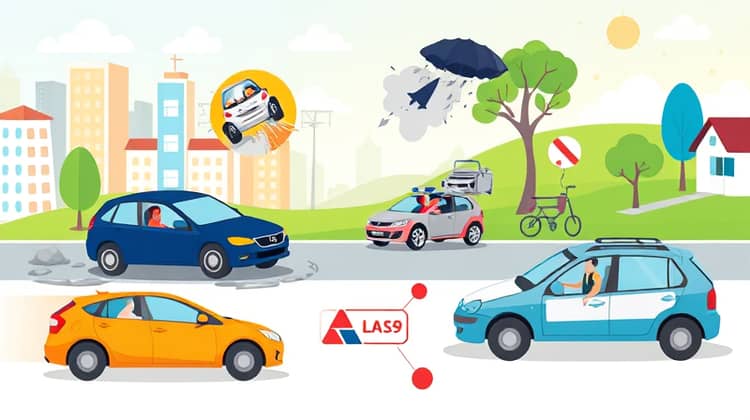When it comes to owning a vehicle, one of the most important responsibilities you take on is securing proper auto insurance. Auto insurance is not just a legal requirement; it serves as a financial safety net in the event of accidents or damage. In this comprehensive guide, we will explore various facets of auto insurance, including what it is, why it is important, and how to select the best policy for your needs.
We will delve into the types of coverage available, the factors that influence insurance rates, and tips for reducing your premiums. Additionally, we'll outline the essential steps to take after an accident to ensure your safety and proper handling of the situation. This article aims to equip you with the knowledge necessary to navigate the often complex landscape of auto insurance with confidence.
By the end of this guide, you'll have a clearer understanding of auto insurance and be prepared to make informed decisions.
What is Auto Insurance?

Auto insurance is a form of risk management primarily designed to protect you from financial loss in the event of an accident, theft, or damage to your vehicle. It provides coverage for various situations that could occur while operating a vehicle, ensuring that both the driver and third parties are protected.
The main components of auto insurance include liability, which covers damages to others when you are at fault; collision, which pays for damage to your own vehicle; and comprehensive coverage, which protects against non-collision related incidents such as theft, vandalism, or natural disasters.
Auto insurance policies can vary widely in terms of coverage limits, deductibles, and premium costs. This variation allows drivers to choose a policy that fits their individual needs and budget. Understanding the specifics of your policy is vital for ensuring sufficient protection.
Additionally, when you purchase auto insurance, the company will evaluate various factors, such as your driving history, the type of vehicle, and where you live, to determine your premium. Insurance companies may also offer discounts based on factors like safe driving records or bundling policies.
In short, auto insurance is an essential component of responsible vehicle ownership, providing necessary protection and peace of mind.
Why is Auto Insurance Important?

Auto insurance is crucial for several reasons. Firstly, it is mandatory in most states, meaning that you are legally required to have a certain level of coverage to drive legally. However, the importance of auto insurance extends beyond legal obligations.
- Protects You Financially: In case of an accident, proper coverage can save you from significant out-of-pocket expenses associated with repairs, medical bills, and legal fees.
- Covers Third Parties: Liability insurance covers damages and injuries to others if you are at fault in an accident, helping you avoid costly lawsuits.
- Offers Peace of Mind: Knowing that you are insured provides peace of mind, allowing you to drive with confidence without constant worry about potential incidents.
- Facilitates Roadside Assistance: Many auto insurance policies include roadside assistance, making it easier to get help in emergencies.
- Protects Your Investment: Cars are significant financial investments; insurance helps safeguard your investment against unforeseen circumstances.
Ultimately, having auto insurance is a wise choice that protects you, your passengers, and other road users.
Types of Auto Insurance Coverage

There are several types of auto insurance coverage available, each designed to protect against different risks. Understanding these types can help you choose the right coverage for your circumstances.
- Liability Coverage: Covers damages to others if you are at fault in an accident.
- Collision Coverage: Pays for damage to your own vehicle after a collision, regardless of fault.
- Comprehensive Coverage: Protects against non-collision incidents such as theft, fire, or natural disasters.
- Personal Injury Protection (PIP): Covers medical expenses for you and your passengers in the event of an accident.
- Uninsured/Underinsured Motorist Coverage: Protects you if you are involved in an accident with someone who lacks sufficient insurance.
Each type of coverage serves a specific purpose, so it’s essential to assess your needs and potential risks when selecting the right combination for your auto insurance policy.
Factors Affecting Auto Insurance Rates

Several factors can influence how much you pay for auto insurance. Understanding these factors can give you insight into your policy cost and help you make informed decisions.
- Driving History: A clean driving record can lead to lower premiums, while accidents or violations can increase costs.
- Location: Where you live can impact your rates; high-crime areas or places prone to accidents often lead to higher premiums.
- Type of Vehicle: High-value or high-performance vehicles may cost more to insure than standard models.
- Credit Score: In some states, insurers consider your credit score when determining rates; better credit can mean lower premiums.
- Coverage Levels: The more coverage you select, the higher your premium will likely be, so it’s essential to balance coverage needs with affordability.
By being aware of these factors, you can take steps to potentially reduce your insurance costs.
How to Choose the Right Auto Insurance

Choosing the right auto insurance can seem daunting, but by following a few simple steps, you can find a policy that suits both your needs and budget.
- Assess Your Coverage Needs: Consider the types of coverage that are most relevant for your situation based on your driving habits and the age or value of your vehicle.
- Compare Quotes: Shopping around and getting quotes from multiple insurance providers can help you find the best coverage at the most competitive rate.
- Check Reviews: Research customer reviews and ratings of the insurance companies you’re considering to ensure they have a strong reputation for customer service and claims processing.
- Understand the Fine Print: Carefully read the terms and conditions of the policy to avoid surprises later on regarding exclusions and limits.
- Review Regularly: Your insurance needs may change over time; be sure to review your policy annually and adjust your coverage as necessary.
Tips for Lowering Your Auto Insurance Premiums

If you’re looking to lower your auto insurance costs, here are some practical tips to consider.
- Increase Your Deductible: Opting for a higher deductible can lower your premium, but ensure you can afford the deductible in case of a claim.
- Take Advantage of Discounts: Ask your insurance provider about available discounts for safe driving, combining policies, or completing defensive driving courses.
- Maintain a Good Credit Score: Work on keeping your credit score high, as insurance companies often use it to determine your rates.
- Bundle Policies: If you have multiple types of insurance, consider bundling them with one provider for potential savings.
- Evaluate Your Coverage: Regularly reassess your coverage needs and adjust any unnecessary coverage limits, especially on older vehicles.
What to Do After an Accident

Experiencing an accident can be overwhelming, but knowing the steps to take afterward can help you handle the situation more effectively.
- Ensure Safety: First and foremost, make sure you and others involved are safe, and call emergency services if necessary.
- Document the Scene: Take photos of the accident scene, vehicle damage, and any relevant road conditions to provide to your insurance company.
- Exchange Information: Collect contact and insurance information from the other driver(s) involved in the accident.
- Notify Your Insurance Provider: Report the accident to your insurer as soon as possible to start the claims process.
- Keep Records: Document all correspondence related to the accident and claim for future reference.
Conclusion

Navigating the world of auto insurance can be complex, but understanding its fundamental aspects can help you make better decisions as a driver.
From the types of coverage available to the factors that influence your premium, having the right information at your disposal can empower you to protect yourself and your vehicle effectively.
Remember that auto insurance is not just about meeting legal requirements; it’s about ensuring your financial security on the road.
Taking time to research and choose the appropriate auto insurance policy can save you money in the long run and provide peace of mind while driving.














